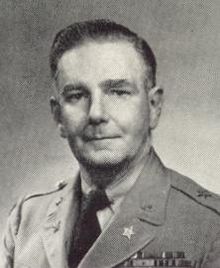Robert A. McClure
| Robert Alexis McClure | |
|---|---|

McClure as a Brigadier General
|
|
| Born |
March 4, 1897 Mattoon, Illinois |
| Died | January 1, 1957 (aged 59) Fort Huachuca, Arizona |
| Allegiance |
|
| Service/branch |
|
| Years of service | 1917-1956 |
| Rank |
|
| Unit |
|
| Battles/wars |
World War I World War II Cold War |
| Awards |
Distinguished Service Medal (2) Legion of Merit (2) Bronze Star Medal |
Robert Alexis McClure (March 4, 1897 – January 1, 1957) was an American general and psychological warfare specialist, who is considered as a Father of U.S. Army Special Warfare.
Born in Mattoon, Illinois, he graduated from the Kentucky Military Institute in 1915. He initially joined the Philippine Constabulary before joining the regular army in 1917.
In 1941 he served as military attaché to the American Embassy in London before being appointed by general Dwight D. Eisenhower to chief of intelligence for the European theater of operation in 1942. Eisenhower next placed him in charge of the Allied Forces Information and Censorship Section which was responsible for the operation of twelve radio stations as well as the censorship of troop mails and cables.
McClure was appointed director of the newly created Psychological Warfare Division of SHAEF in 1944. With the end of the war in Europe he was responsible for the Information Control Division which controlled broadcasting and newspapers in Germany during the early stage of the occupation.
After the invasion of Korea in 1950, beginning the Korean War, the Office of the Chief of Psychological Warfare was formed in Washington, D.C., headed by McClure. During his tenure, the Psychological Warfare Center was established at Fort Bragg, North Carolina which centralized the newly formed Psychological Warfare School and 10th Special Forces Group at a single location.
In 1952, McClure was assigned to Iran as chief of three U.S. Military Missions, where he played a role in the 1953 d'état and formed a close relationship with the Shah.
...
Wikipedia
